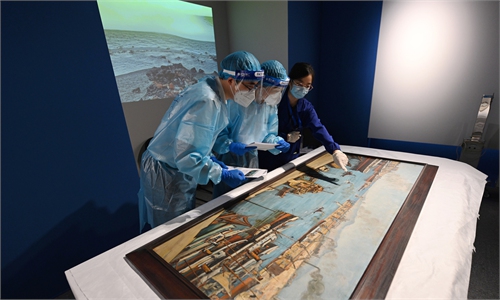
Brazilian President Jair Bolsonaro and First Lady Michelle Bolsonaro are surrounded by children as they stand next to an urn containing the embalmed heart of Dom Pedro I, founder and first ruler of the Empire of Brazil, during an official ceremony with military honors at Planalto Palace in Brasilia, on August 23, 2022. Photo: VCG
With full regalia, military honors and a skywriting squad, Brazilian President Jair Bolsonaro presided over a lavish gala on Tuesday for the embalmed heart of Emperor Pedro I, who declared Brazil's independence from Portugal 200 years ago.Dom Pedro I's heart had been kept in a church in the Portuguese city of Porto since his death in Portugal in 1834. It is being loaned for three weeks to Brazil, where it will be put on display as part of independence anniversary celebrations.
Dom Pedro, a beloved figure in both Brazilian and Portuguese history, has been divided between the two countries in death - his heart enshrined in a church in Porto and the rest of his remains in an independence monument in Sao Paulo.
Dom Pedro fled to Brazil with his family as a 9-year-old boy when Napoleon's army invaded Portugal in 1807.
He stayed behind to rule the then-colony as regent when his father, King Joao VI, returned home to the increasingly restless metropole in 1821. Pedro I declared Brazil an independent country on September 7, 1822, and became its first emperor.
But no sooner had he thrown off Portuguese rule and established Brazil as a constitutional empire than turbulence across the Atlantic forced him to return to Portugal. His younger brother had usurped the Portuguese throne and was attempting to return the country from constitutional government to absolute monarchy.
Pedro I, who is known in Portugal as Pedro IV, abdicated in 1831 and sailed back to Portugal, leading an army into Porto in support of the constitutionalists' ultimately successful struggle.
After his death, he was celebrated in both Brazil and Portugal as a champion of liberal causes and representative rule. At his request, his heart was removed and kept in Porto, in gratitude to its people for their support.



